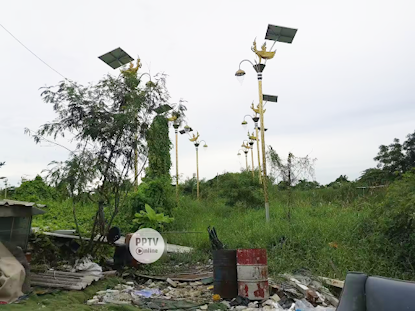
By Torplus Yomnak, Co-Founder of HAND Social Enterprise and the Director of the Knowledge Hub for Regional Anti-Corruption and Good Governance Collaboration (KRAC)
In May 2021, amid the pandemic lockdowns, a villager in Thailand took a stroll on the outskirts of their town, making an unexpected discovery that would stir the local community. There, on an overgrown, vacant plot of land, hidden among tall weeds, stood rows of ornately decorated solar lamp posts. Topped with golden Kinnaree—a mythical half-bird, half-woman creature, they seemed out of place next to a garbage heap and a barely accessible road.
It wasn’t just the unexpected beauty or bizarre location of the lights that came as a surprise, but how exactly such an investment could have been justified by the local administration in what was practically the middle of nowhere. This mystery led the villager to investigate further using ACT Ai, a platform developed by the Anti-Corruption Organization of Thailand in collaboration with HAND Social Enterprise. ACT and HAND have been strengthening Thailand’s anti-corruption network not just with large public organizations but also with local civil society groups. A publicly available tool, ACT Ai aggregates data on over 31 million public procurement projects, linking them with company registration data to detect potential fraud and corruption.
When ACT Ai was launched, it attracted the attention of people from various backgrounds, especially villagers who are keen on looking after the welfare of their communities. The villager reporting the lamp posts was one of them.
Using ACT Ai, the villager quickly discovered that each lamp post cost the district over 100,000 Thai Baht (US$3,000)—a stark contrast to the 10,000 Baht (US$300) price tag for a similar lamp post online. Further digging revealed the scope of this procurement: a staggering 6,773 lamp posts had been bought in nine transactions totaling 673 million Baht (US$18.2 million), with plans for more purchases underway.
Incensed by these findings, the villager reached out to MustShare, a popular whistleblowing Facebook page. The page admins continued the investigation using ACT Ai, verifying the details and sharing the story on social media. The post quickly went viral, sparking widespread public outrage over the apparent misappropriation of funds.
The case, which drew immediate attention from various anti-corruption authorities, highlighted the powerful role citizens can play in promoting good governance. An investigation launched by the National Anti-Corruption Agency examined potential irregularities in similar contracts dating back to 2013, and charges were brought against more than 40 people. Concerns were raised over suspicious tendering practices such as short bidding periods, overly rigid specifications, and potential collusion. In April 2024, the NACC passed a resolution to indict the village’s mayor and his associates for misconduct in awarding and managing the project, according to local media.
Interestingly, the identity of the whistleblower remains unknown, focusing attention solely on the issue and safeguarding the individual from potential backlash.
An estimated $13 billion is spent on public contracts in Thailand every year. With more datasets made available and standardized, the potential to detect and deter corruption on a wider scale increases, protecting honest officials from undue political pressure and promoting a just governance system. For example, Thailand’s procurement data could be improved by releasing planning data and ensuring a more timely publication.
While open data is a vital first step, it is not the only important factor in combating corruption. Civic engagement, freedom of the press, efficient and safe whistleblowing channels, and effective investigative authorities are all crucial components. Open data provides the foundation for these other elements to thrive, enabling citizens, journalists, and authorities to act as watchdogs and hold those in power accountable.
The discovery of the overpriced lamp posts is just one example that shows how increasing transparency and opening up data on government spending can lead to more accountability in public administration. At the local level, citizens keeping alert on public spending can ensure public money is spent where it’s needed most.
This is where Open Contracting Partnership’s support has been helpful with our efforts in Thailand, as they are working with the Bangkok Metropolitan Administration (BMA) in alliance with HAND Social Enterprise. We began by examining the city’s procurement data and the potential for adopting open contracting approaches. Now, the BMA is using procurement data for better flood management as part of Lift, OCP’s impact accelerator program.
We look forward to seeing how this pilot project in Bangkok can be a lever for promoting better open data and transforming public procurement in Thailand and the region.
Photo source: PPTV HD
